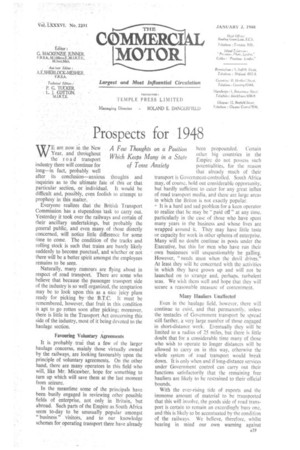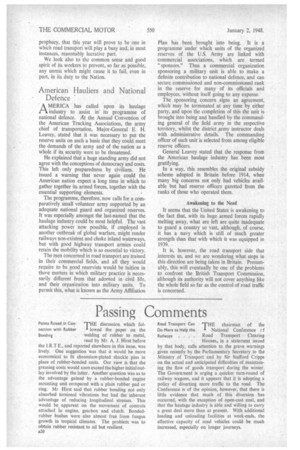Prospects for 1948
Page 21

Page 22

If you've noticed an error in this article please click here to report it so we can fix it.
WEare now in the New A Few Thoughts on a Position Year, and throughout
Which Keeps Many in a State
the' road transport industry there will continue for of Tense Anxiety long—in fact, probably well after its conclusion—anxious thoughts and inquiries as to the ultimate fate of this or that particular section, or individual. It would be difficult and, possibly, even foolish to attempt to prophesy in this matter.
Everyone realizes that the British Transport Commission has a stupendous task to carry out_ Yesterday it took over the railways and certain of their ancillary undertakings, but probably the general public, and even many of those directly concerned, will notice little difference for some time to come. The condition of the tracks and rolling stock is such that trains are barely likely suddenly to become punctual, and whether or not there will be a better spirit amongst the employees remains to be seep.
Naturally, many rumours are flying about in respect of road transport. There are some who believe that because the passenger transport side of the industry is so well organized, the temptation may be to look upon this as a nice juicy plum ready for picking by the B.T.C. It must be remembered, however, that fruit in this condition is apt to go rotten soon after picking; moreover, there is little in the Transport Act concerning this side of the industry, most of it being devoted to the haulage section.
Favouring Voluntary Agreements It is probably true that a few of the larger haulage concerns, mainly those virtually owned by the railways, are looking favourably upon the principle of voluntary agreements. On the other hand, there are many operators in this field who will, like Mr. Micawber, hope for something to turn up which will save them at the last moment from seizure.
In the meantime some of the principals have been busily engaged in reviewing other possible fields of enterprise, not only in Britain, but abroad. Such parts of the Empire as South Africa seem to-day to be unusually popular amongst " business ' Visitors, and to our knowledge schemes for operating transport there have already been propounded. Certain other big countries in the Empire do not possess such potentialities, for the reason that already much of their transport is Government-controlled, South Africa may, of course, hold out considerable opportunity, but hardly sufficient to cater for any great influx of road transport media, and there are large areas in which the Briton is not exactly popular.
It is a hard and sad problem for a keen operator to realize that he may be "paid off" at any time, particularly in the case of those who have spent many years in the business and whose lives are wrapped around it. They may have little taste or capacity for work in other spheres of enterprise. Many will no doubt continue in posts under the Executive, but this for men who have run their own businesses will unquestionably be galling. However, "needs must when the devil drives." At least they will be concerned with the activities in which they have grown up and will not be launched on to strange and, perhaps, turbulent seas. We wish them well and hope that they will secure a reasonable measure of contentment, Many Hauliers Unaffected Even in the haulage field, however, there will continue to exist, and that permanently, unless the tentacles of Government transport be spread still farther, a very large number of those engaged in short-distance work. Eventually they will be limited to a radius of 25 miles, but there is little doubt that for a considerable time many of those who wish to operate to longer distances will be allowed to carry on in this way, otherwise the whole system of road transport would break down. It is only when and if long-distance services under Government control can carry out their functions satisfactorily that the remaining free hauliers are likely to he restrained to their official bounds.
With the ever-rising tide of exports and the immense amount of material to be transported that this will involve, the goods side of road transport is certain to remain an exceedingly busy one, and this is likely to be accentuated by the condition of the railways. We believe, therefore, whilst bearing in mind our own warning against prophecy, that this year will prove to be one in which road transport will play a busy and, in most instances, reasonably lucrative part.
We look also to thJ common sense and good spirit of its workers to prevent, so far as possible, any unrest which might cause it to fail, even in part, in its duty to the Nation.
American Hauliers and National Defence
AMERICA has called upon its haulage industry to assist in its programme of national defence. At the Annual Convention of the American Trucking Associations, the army chief of transportation, Major-General E. H. Leavey, stated that it was necessary to put the reserve units on such a basis that they could meet the demands of the army and of the nation as a whole if its security were to be threatened.
He explained that a huge standing army did not agree with the conceptions of democracy and costs. This left only preparedness by civilians. He issued a warning that never again could the American nation expect a long time in which to gather together its armed forces, together with the essential supporting elements.
The programme, therefore, now calls for a comparatively small volunteer army supported by an adequate national guard and organized reserves. It was especially amongst the last-named that the haulage industry could be most helpful. The vast attacking power now possible, if employed in another outbreak of global warfare, might render railways non-existent and choke inland waterways, but with good highway transport armies could retain the mobility which is so essential to victory.
The men concerned in road transport are trained in their commercial fields, and all they would require to be good reservists would be tuition in thwe matters in which military practice is necessarily different from that adonted in civil life, and their organization into military units. To permit this, what is known as the Army Affiliation Plan has been brought into being. It is a programme under which units of the organized reserves of the U.S. Army are linked with commercial associations, which are termed "sponsors." Thus a commercial organization sponsoring a military unit is able to make a definite contribution to national defence, and can secure commissioned and non-commissioned rank in the reserve for many of its officials and employees, without itself going to any expense.
The sponsoring concern signs an agreement, which may be terminated at any time by either party. and upon the completion of this the unit is brought into being and handled by the commanding general of the field army in the respective territory, whilst the district army instructor deals with administrative details. The commanding officer of such unit is selected from among eligible reserve officers.
General Leavey stated that the response from the American haulage industry has been most gratifying.
In a way, this resembles the original subsidy scheme adopted in Britain before 1914, when many big concerns not only had vehicles available but had reserve officers gazetted from the ranks of those who operated them.
Awakening to the Need It seems that the United States is awakening to the fact that, with its huge armed forces rapidly melting away, what are left are quite inadequate to guard a country so vast, although, of course, it has a navy which is still of much greater strength than that with which it was equipped in 1939.
It is, however, the road transport side that interests us, and we are wondering what steps in this direction are being taken in Britain. Presumably, this will eventually be one of the problems to confront the British Transport Commission, although its authority will not cover anything like the whole field so far as the control of road traffic is concerned.












































































